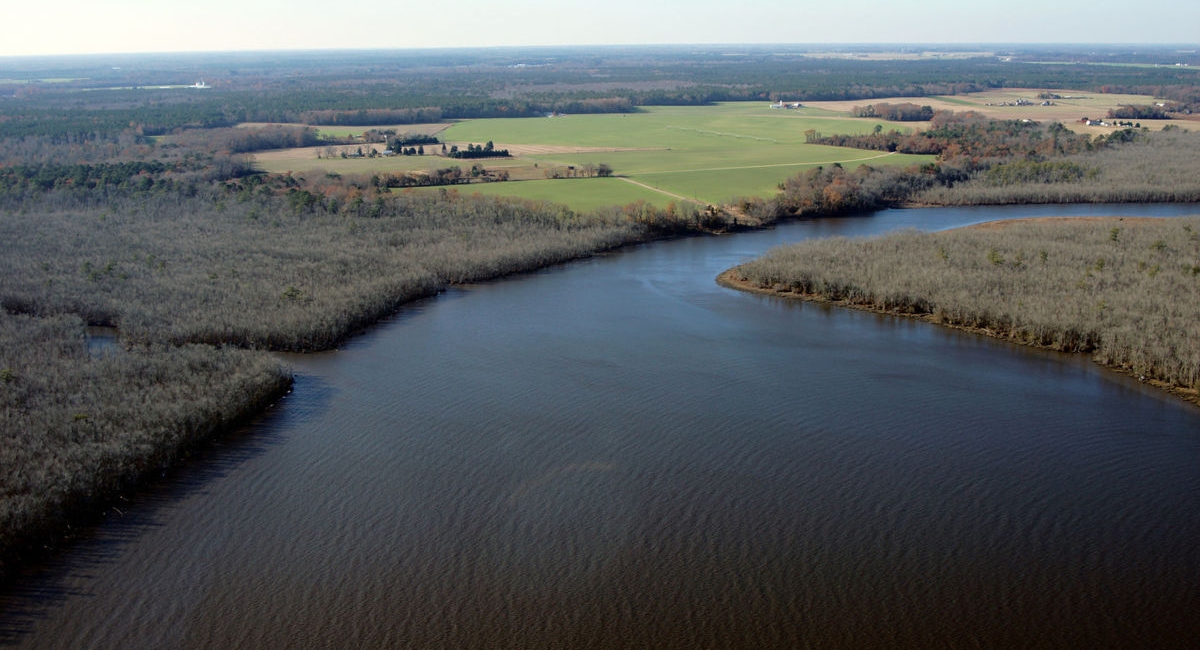PATUXENT RIVER, Md. (July 22, 2016)—NAS Patuxent River and the Naval Air Warfare Center Aircraft Division's (NAWCAD) Atlantic Test Ranges (ATR) have achieved a major milestone by protecting 5,000 acres beneath the airspace.
Recently, the Navy partnered with the Lower Shore Land Trust, Maryland Department of Natural Resources (DNR), and Wicomico County to preserve a 475-acre farm on Maryland's Eastern Shore via a conservation easement through the DoD Readiness and Environmental Integration (REPI) program.
Since 2010, ATR and Pax River have been partnering with communities and conservation organizations under the REPI program to preserve land. REPI supports cost-sharing agreements between military services, private conservation organizations, and both state and local governments to secure conservation easements from willing landowners near installations and ranges.
Essential for conducting the highly specialized testing and training at Pax River and NAWCAD, the ATR inner range covers 2,360 square miles of restricted airspace, spanning parts of the Chesapeake Bay, Maryland, Delaware, and Virginia—a landscape that is home to a variety of special status plants and animals, is rich in cultural and historical resources, and provides recreation for millions.
By maintaining compatible land use and preserving habitat where the military tests, trains and operates, REPI partnerships not only protect and preserve the open land required for military activities, but also provide benefits to the local environment and community.
"Each acre preserved through this partnership is helping to create a corridor of land compatible with our Navy mission and supports our rural communities, our local states and our environment," said Rob Vargo, ATR director.
Together with their partners, Pax River and ATR have successfully preserved 20 parcels through REPI beneath the range's restricted airspace in southern Maryland, the Eastern Shore, and Delaware. These easements prevent future residential, commercial, or industrial development that could impact the ATR mission, while allowing landowners to maintain ownership of their property as a farm or forest.
"A conservation easement has allowed our family to keep our land in agriculture and preserve open space without having to develop or sell lots," explained Eastern Shore landowner Ed Breitschwerdt.
In addition to preserving farmlands, there are numerous ecological benefits, which include protecting endangered species, preserving habitat and improving the health of the Chesapeake Bay. Identifying land parcels whose protection is both critical to preserving the range mission and meeting the conservation goals of the partner is key.
REPI efforts are focused on developing conservation corridors by preserving large, contiguous blocks of land adjacent to protected areas. These corridors provide forest and wetland habitat for wildlife, such as the recently delisted Delmarva fox squirrel and migratory birds, and potentially reduce the number of future threatened and endangered species in the region.
Preserving the rural landscape also enhances the area's attraction for visitors seeking outdoor recreation and eco-tourism.
In instances where the landowner is interested in selling the parcel instead of a conservation easement, partners can purchase the property for use as public parklands. The Navy assists by providing funding and receives an easement to ensure operations are protected but does not own or manage the property. These parklands provide an opportunity for public access, allowing for the added benefit of outdoor recreation such as hiking, hunting, birding and water access.
The success of the REPI program requires the commitment and collaboration of many different organizations and partners who share common goals in the region.
"We could not have protected these 5,000 acres without our dedicated partners and the willing landowners who choose to preserve their land," Vargo said.
The partnership has grown to include 14 partners from three states, local counties, land trusts and conservation organizations, including the Lower Shore Land Trust and Maryland DNR; and these partnerships have been an integral part of the success of the REPI program.
The largest share of partner funding for REPI projects within the airspace to date, has come from the state of Maryland's Rural Legacy Program. This program provides dedicated funding towards designated Rural Legacy Areas to protect valuable open spaces and conserve habitat.
"We are pleased to be working with the Navy and MD DNR to leverage important land protection funds," said Kate Patton, executive director of the Lower Shore Land Trust. "This partnership gives us the opportunity to assist additional landowners and protect water quality, wildlife habitat and working lands on the Lower Eastern Shore."
NAS Pax Protects 5,000 Acres Through REPI

Through the Readiness and Environmental Integration (REPI) program, NAS Patuxent River and Naval Air Warfare Center Aircraft Division's Atlantic Test Ranges have preserved more than 5,000 acres beneath the airspace protecting research, development, testing, and evaluation missions, along with working farms and open space. (Photo courtesy of Chesapeake Conservancy)


